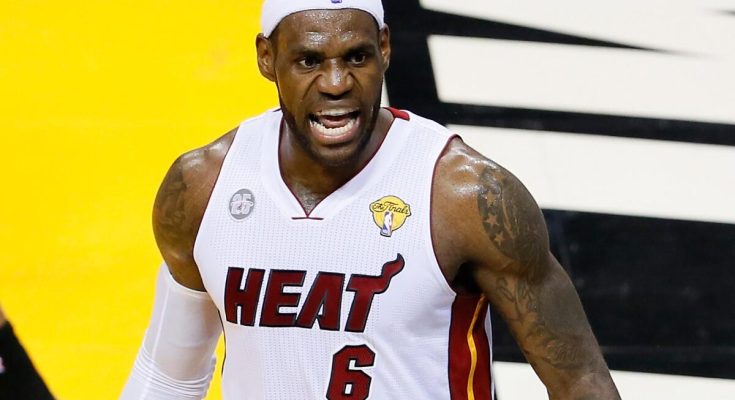The world of professional sports is often a thrilling mix of high-stakes competition, passionate fans, and valuable memorabilia that captures the essence of iconic moments and legendary players. For the Miami Heat, a franchise that has experienced both championship glory and cultural significance in the NBA, the preservation of its history and memorabilia is paramount. However, a recent scandal has cast a shadow over the organization, revealing a disturbing betrayal from within. A former Miami Heat security officer has been accused of stealing and selling millions of dollars’ worth of team memorabilia, shocking the franchise, its fans, and the broader sports community.
The allegations against the former security officer involve an extensive and systematic theft of valuable Miami Heat artifacts and collectibles, many of which hold not only financial worth but immense sentimental value. These items include signed jerseys, game-worn sneakers, championship rings, and rare collectibles associated with some of the greatest moments in Heat history. The impact of such theft goes beyond monetary loss—it strikes at the heart of the team’s legacy and the trust placed in those entrusted to protect it.
The Miami Heat organization prides itself on a strong culture of accountability, professionalism, and respect for its history. The franchise has built a loyal fan base over decades, highlighted by the legendary eras of Dwyane Wade, LeBron James, Chris Bosh, and the current roster striving to build the next chapter of success. Collectibles and memorabilia form a tangible link between these eras and fans, representing the sweat, dedication, and triumphs that define the team’s identity. When such artifacts are stolen, it is more than just property—it is a theft of shared memories and pride.
According to law enforcement and legal sources involved in the case, the former security officer exploited his position of trust to access secured areas where valuable memorabilia were stored. Over time, the officer allegedly removed these items without detection, creating a secret inventory of stolen goods that reportedly fetched millions of dollars on the black market. The thefts went unnoticed for an extended period, raising questions about internal oversight and security protocols.
The black market for sports memorabilia is a lucrative and often shadowy industry. Authentic, rare pieces from major sports franchises can command extraordinarily high prices from collectors worldwide. Unfortunately, this demand also creates opportunities for illegal trafficking and counterfeit operations. Stolen memorabilia not only undermines the legitimate collector market but also damages the reputation of the franchises involved. The Miami Heat’s case is particularly egregious because the theft came from within, by someone who was supposed to safeguard these treasures.
The legal proceedings against the accused security officer are ongoing, but the charges are severe. Federal authorities have become involved due to the interstate nature of the sales and shipments of stolen goods. Transporting stolen property across state lines to evade detection escalates the seriousness of the crime. If convicted, the former officer faces significant prison time and fines, as well as civil liability for damages caused to the Miami Heat organization.
For the Heat, this scandal has triggered a comprehensive internal review. The franchise is working closely with law enforcement to identify gaps in security and ensure that such a breach never occurs again. This includes revisiting access controls, surveillance measures, and inventory management systems. The organization has also publicly reaffirmed its commitment to transparency and to making restitution for any losses sustained.
Fans of the Miami Heat have expressed a range of emotions since news of the theft broke. Many feel betrayed and saddened by the breach of trust, especially given the emotional significance attached to memorabilia. Social media and fan forums have seen an outpouring of support for the team and a call for stricter measures to protect the franchise’s legacy. Some collectors have voiced concern about the authenticity and provenance of memorabilia available on the market moving forward.
The incident also highlights a broader issue in the sports world regarding the security of valuable assets. Teams across leagues often store memorabilia in warehouses or secure rooms, but the human factor remains a vulnerability. Trusting employees with access to these areas requires rigorous vetting and monitoring, and incidents like this serve as a cautionary tale. The sports industry as a whole is now paying closer attention to safeguarding its historical assets.
Beyond the immediate financial and reputational damage, the Miami Heat case offers a lesson in how organizations can better protect their legacies. Regular audits, enhanced surveillance technology, and a culture of accountability are critical. Moreover, educating staff on the importance of these artifacts and creating a shared sense of pride can deter internal theft. Many franchises have started to adopt such proactive measures in response to similar incidents.
From a legal standpoint, the case underscores the increasing efforts by law enforcement to crack down on stolen sports memorabilia rings. Federal prosecutors are recognizing the impact these crimes have on the cultural and economic fabric of sports. By pursuing charges aggressively, authorities aim to send a strong message that such betrayals will not be tolerated.
Meanwhile, collectors and fans are urged to exercise caution when purchasing high-value memorabilia. Verifying authenticity through trusted channels and provenance documentation is essential to avoid inadvertently supporting illicit markets. The Miami Heat theft scandal serves as a stark reminder of how vulnerable the memorabilia world can be to exploitation.
Despite this setback, the Miami Heat franchise remains resilient. The team continues to focus on its mission on the court, building a competitive roster and connecting with fans through community initiatives and events. The legacy of the Heat is not defined solely by physical artifacts but by the passion, determination, and spirit that the team embodies. While the theft scandal is a painful chapter, it will not erase the memories of championship runs, legendary players, and moments that have inspired generations.
In the aftermath, there is hope that this incident will lead to stronger protections and renewed appreciation for the priceless nature of sports memorabilia. For the Miami Heat, it is a call to guard not only physical treasures but also the intangible bonds that unite the team, its players, and its fans. The franchise’s swift response and cooperation with authorities reflect a commitment to healing and safeguarding its proud history.
Ultimately, the story of the former Miami Heat security officer accused of stealing and selling millions in memorabilia is a cautionary tale of trust betrayed and the value of vigilance. It is a reminder that behind every great sports franchise lies a responsibility to protect its legacy from those who might exploit it. For fans and the sports community alike, it is a moment to reflect on the importance of integrity, respect, and the shared heritage that makes sports more than just a game.



